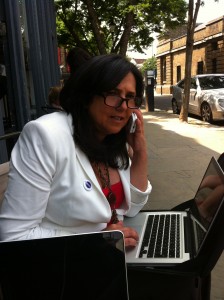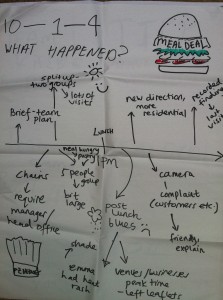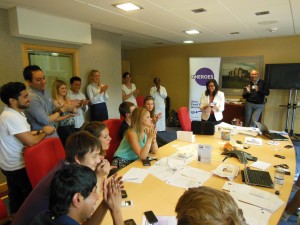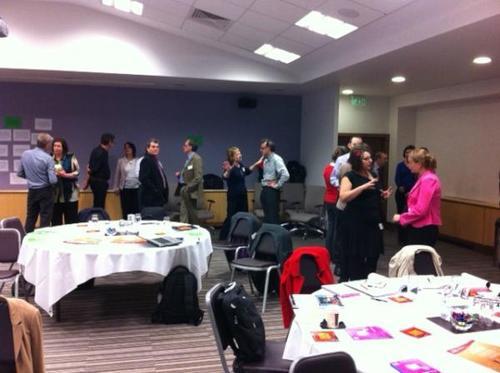This quote, from one of the Accenture team who took part in a Corporate Social Responsibility (CSR) volunteer day in blistering conditions at Islington, London a few weeks back, was in response to a question I posed at the conclusion of the event:
Q) As you leave: if someone in the office asked you about the day what would you say?
A) ‘Was a great day with a chance to do some real good.’ was another participant’s reply.
Those who follow my musings will know how honoured I am to be invited to become a founder trustee of the charity PlanZheroes (PZ) who aim to help make use of surplus food. The CSR day, one of a number of imaginative ‘offerings’ PZ developed, gives organisations and their employees a chance to put something back into their community while concurrently testing their innovation, teamwork, sales, negotiation and project management skills in a real life setting.
‘…your task…’
To make the day really energetic PZ introduced an Apprentice-style competitive element. Fifteen people, three teams, three separate areas of London: Who will raise most awareness and get most businesses and charities added to the map?
I was there with CEO Designate Maria Ana Neves and a team from PZ whose role was to shadow the teams as they made their way around Islington and to provide input for the debrief session that was to end the day.
The 16 participants began by introducing themselves and noting something that others might not know about them. This was to prove a great kick off session, part of the briefing to equip them for the time they were about to spend out and about in Islington. We asked later what they’d expected:
Q) On arrival what were you expectations?
A) I did not expect the day to be as organised as it was or to have such supportive helpers
fired up and ready to go
Briefing over and armed with PZ badges and little books each team spent a while perfecting their strategy, the messages they were going to give to the organisations they met and who would be doing what. A large part of the challenge of approaching food outlets is to recognise that surplus food is a natural by product of the suply chain, hence we advised them to avoid using the word ‘waste’.
We were not to see them now for 5 hours so Maria Ana and I monitoroed their progress via Twitter and the PZ Map updated as contacts were made and organisations signed up.
The teams assembled back at base just before 4pm for the debrief. I asked them to use a timeline as a prompt to describe what happened, when and who was involved with a further commentary as to how they overcame difficult moments.
Though lighthearted it gave the teams (and a senior manager who joined at this point) a chance to compare and contrast: what had worked and what hadn’t; where did they get pushback, from whom (and why)?
amazing results
Before revealing the results Maria Ana asked the teams to develop a one sentence ‘why we should win’ statement. The ‘results’ were amazing:
- 14 new businesses on the map & 1 new charity sign-up
- 35 businesses to follow up & 2 new charities to follow-up
- one team even walked to Holborn to talk with Sainsbury’s head office
- two teams got their lunches for free (or part of it!)
- 130 mix of facebook likes and tweets/followers and we were told one celebrity chef is supporting us (details to find)
Perhaps the most value though comes from the way the teams come together and the roles they play throughout the day. Here’s a couple of responses to my question about role models:
Q) Role model: who did you admire during the day and why – tell us about what they did?
A) One memeber of the team really came out of their shell and were particularly confident when approaching businesses …
A) …The person was awesome and I think I have learnt some people skills that day.
To learn more about Plan Zheroes’ special days for volunteers and organisations please contract us via the PZ website





